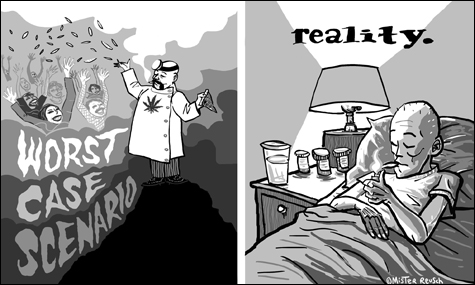Opponents’ fears go unrealized with the impementation of rhode island’s law
By TE-PING CHEN | May 2, 2007
 |
Two hits of marijuana in the morning, and two in the evening before he goes to sleep. That’s what it takes to get Bobby Ebert through the day.
But Ebert’s not a junkie or a college student looking for a quick high. He has AIDS — and is one of more than 240 patients in Rhode Island whose use of marijuana is protected under state law.
In January 2006, the General Assembly resoundingly overrode Governor Donald L. Carcieri’s veto, thereby making medical marijuana legal in Rhode Island. The law — which allows patients suffering from “chronic and debilitating” medical conditions to use the drug, so long as they obtain a state-certified physician’s permission — is scheduled to expire June 30.
The sunset provision was included, notes Representative Thomas Slater (D-Providence), the prime sponsor of the House effort in 2005, “[Because] we wanted a trial period to prove there wouldn’t be problems with this kind of legislation.” Opponents, including Carcieri, had cited fears that illegal use of marijuana could proliferate, and that insufficient controls existed for the production and distribution of the drug for its intended purpose.
Yet since going into effect in April 2006, Rhode Island’s program has been conspicuous mostly for its lack of controversy. Charles Alexandre, the state Health Department’s chief of Health Professions Regulation, describes the law as having “worked well and been pretty uneventful.”
Even the police chief in North Kingstown, whose department made the arrest last fall of a registered medical marijuana user who was busted after soliciting underage girls on MySpace to smoke pot, calls that case an “aberration.”
Ironically, in contrast to the initial concerns cited by opponents, the main challenge facing medical marijuana users in Rhode Island is obtaining access to the drug. Boosters are targeting this need with a new approach, but more about this later.
As it stands, the state’s medical marijuana law enjoys robust public approval — a Mason-Dixon poll last September found that 79 percent of Rhode Islanders support the current program. And perhaps that’s not surprising. In a small state like Rhode Island, where the traditional six degrees of separation quickly gets streamlined into relationships far more intimate and immediate, the issue can be understood quite simply. A coworker with cancer, an uncle with AIDS: push deeply enough, it seems, and everyone has a story.
And while Carcieri and the Rhode Island State Police oppose legislation to make permanent the state’s medical marijuana law, the General Assembly appears poised to again override any potential veto. As the Phoenix was going to press, the full House and Senate were scheduled to separately consider the measure.
Yet on a national level, the science of the drug, and the social implications of its medical use, remain hotly contested political topics. As more than 20 states gear up to consider medical marijuana bills, it’s open season on the issue — potentially making the experience of states like Rhode Island more relevant in the ongoing debate.
 Related
Related:
- Politics of pain
Rhode Island follows through on medical marijuana
- Prescriptions for pot
It is time to make the medical use of marijuana legal. Plus, genocide and the ADL
- Slow ride
The Massachusetts legislature’s unfinished business
- Healey gets it wrong
By opposing needle legalization, the Republican lieutenant governor plays politics with life and death
- Rethinking 9/11
Eleven thinkers reflect on how their ideas have changed since September 11
- Less

 Topics
Topics:
Lifestyle Features
, Bobby Ebert
, Health Care Issues
, Health and Fitness
, More  , Bobby Ebert
, Health Care Issues
, Health and Fitness
, Medicine
, Medical Marijuana
, Don Carcieri
, Tom Angell
, Rhode Island Patient Advocacy Coalition
, Marijuana
, Illegal Drugs
, Less
, Bobby Ebert
, Health Care Issues
, Health and Fitness
, Medicine
, Medical Marijuana
, Don Carcieri
, Tom Angell
, Rhode Island Patient Advocacy Coalition
, Marijuana
, Illegal Drugs
, Less 